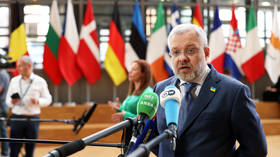Time for Western media to retire its Russian 'state TV' obsession? Russians now overwhelmingly use internet as main news source

Russians are relying less and less on television as their main news source, with just 23% now saying they see it as the most trustworthy form of media. The box has been pushed out by the internet, including social media (55%).
The research was conducted by UK-based company Deloitte, and published by Moscow newspaper Kommersant, on Tuesday.
In the Western press, Russians are often depicted as being restricted to state-run TV for their information about the outside world. While much of the country’s television industry is indeed dominated by stations controlled by government entities, citizens themselves are moving en masse towards the internet for various viewpoints.
According to the results, 55 percent of Russians named internet sources – either social media/blogs (16 percent) or online news/official websites (39 percent) – as their preferred place to consume information. Outside of the internet and television, eight percent said word-of-mouth was their favored source, with radio and newspapers far behind.
In comparison to other demographics, Deloitte discovered that Muscovites (20 percent) and students (15 percent) are the least likely to watch television for their news, with the highest level of trust coming from people over 65 (36 percent).
Also on rt.com Lazy Western caricatures claiming Russian media is overwhelmingly ‘state-run’ are out of date – the internet is where it’s at nowAccording to Deloitte, reliance on TV has dropped five percentage points from 28 percent in 2019, as more and more Russians begin to use news websites and social media to keep themselves in the loop. However, TV executives who spoke to Kommersant believe the findings are wrong.
According to Alexander Nechaev, the deputy director-general of VGTRK, the state-owned broadcaster running popular channels such as Russia-1, Russia-24, and Russia-K, the number of television viewers is actually on the rise. Nechaev believes the current situation with foreign policy, the economy, and the Covid-19 pandemic has contributed to an increase in demand.
The editor-in-chief of Gazprom-owned channel NTV, Alexandra Kosharnitskaya, also noted that viewing time for news programs has grown compared to 2019.
Also on rt.com Western pundits confounded again as Putin’s popularity rises despite major shift in Russian news consumption from TV to onlineIn recent years, social media, particularly YouTube, has been a growing source of information for Russia’s youth. Celebrities like Yury Dud (8.16 million subscribers) interview some of the country’s biggest names, and opposition figures like Alexey Navalny (4.17 million subscribers) use the platform to develop their political base. Other former television personalities like Alexey Pivovarov (1.62 million subscribers) have moved from the medium to the internet, taking full editorial control of their own content.
Think your friends would be interested? Share this story!













